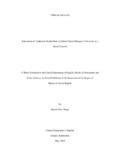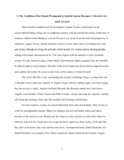Please use this identifier to cite or link to this item:
https://elibrary.tucl.edu.np/handle/123456789/3107| Title: | Subversion of Traditional Gender Role in Gabriel Garcia Marquez’s Chronicle of a Death Foretold |
| Authors: | Thapa, Shyam Dixit |
| Keywords: | Gender Roles;Literature;Novel |
| Issue Date: | 2019 |
| Publisher: | Central Departmental of English |
| Abstract: | This research analyzes Marquez’s Chronicle of a Death Foretold from the perspective of feminism. The representation and characterization of women in this novel provides an understanding of the varied ways in which patriarchy gets constituted, constructed and re-invented in the Latin American context and experience. Marquez’s women characters in the novella reflect not just the extent of women’s internalization of this hierarchy or their exploitation under this unequal gendered system, but his characterization also reveals the diversity of women’s subversions and resistances to this oppressive subjugation. Patriarchy in Latin America is unique in its assertion as it works in a society where indigenous cultural practices have been rooted in a celebration of and openness about sexuality. Through the character of Angela Vicario, Marquez presents to us these various dynamics at work in assertion of patriarchy and exploitation of women; the complex links between gender, class and violence; and the trajectories of resistance that women adopt to build an independent space for themselves under such an oppressive system. Angela’s situation raises questions of class exploitation and the position of women under the Christian value system. For Bayado, it is merely a matter of ‘conquest’ of the woman he chooses. Angela Vicario becomes the passive object of her sexual desire. His class position and wealth allowed him this privilege. Bayado becomes representative of the foreign imperialist presence in Latin America. It is made clear in the novel that Angela from the very beginning did not feel any attraction towards Bayado San Roman. Marquez thus critiques this system of exploitation that leaves no space for women to assert or even voice her own choice or opinion. He shows how such a situation is made worse under family pressure mediated through the power exerted by a prospective proposal of social mobility. |
| URI: | http://elibrary.tucl.edu.np/handle/123456789/3107 |
| Appears in Collections: | English |
Files in This Item:
| File | Description | Size | Format | |
|---|---|---|---|---|
| Cover.pdf | 21.22 kB | Adobe PDF |  View/Open | |
| Chapter.pdf | 113.43 kB | Adobe PDF |  View/Open |
Items in DSpace are protected by copyright, with all rights reserved, unless otherwise indicated.
